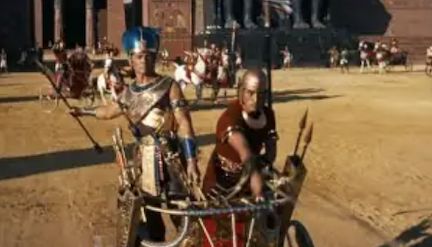God's Relentless Pursuit
"Surely goodness and mercy shall follow me all the days of my life, and I shall dwell in the house of the LORD forever" (Psalms 23:6, ESV).
What an inappropriate translation for Psalm 23!
The word for follow is the same word used when Pharaoh's heart was hardened after he had let the Israelites leave. Did Pharaoh "follow" them? No, he PURSUED them; he wanted them back!

The same word is used when Saul was looking for David. Was Saul 'following' David? No, he hunted him down! This word is used many times when a person or group is chasing another, and is not, in context, translated as "follow."
Several "literal" translations express it this way:
Literal Standard Version
Surely goodness and kindness pursue me All the days of my life, And my dwelling [is] in the house of YHWH, For [the] length of [my] days!
Young's Literal Translation
Only -- goodness and kindness pursue me, All the days of my life, And my dwelling is in the house of Jehovah, For a length of days!
Smith's Literal Translation
Surely goodness and mercy, shall pursue me all the days of my life: and I dwelt in the house of Jehovah to the length of days.
Make no mistake: the goodness of God is not following you like a puppy waiting to be noticed, it is pursuing you, chasing you down, hunting you, urging you to notice it. The passion with which a man will hunt his enemy, the seething desire one has to see his foe destroyed is the same zeal, vigor and perseverance God uses to love, care for and bless us. Turn around and acknowledge the One who has chased you for so long and thank Him for His relentless pursuit and the excessive devotion that allows your cup to be overflowing!
Smiling, Happy Faces, Filling a Void, Accomplishing Nothing
If you’ve ever been to a Costco to shop, you know that you cannot leave the store without showing your receipt to an exit attendant who will dutifully match your receipt against the items in your cart to be sure you haven’t “forgotten” to pay for anything.
Well, a recent trip to the retail giant produced quite a Wait. What?! moment as we were exiting the store with our full-to-overflowing shopping haul.
The friendly, smiling exit attendant asked for our receipt, and we promptly produced it. She scanned the receipt, then our cart, then the receipt again. She then humbly apologized that it was taking so long, informing us that she just needed to find the rib roast (we know — a BIG extravagance!) we had just paid for. After another moment, she said, again with a big, bright smile, “Ahhh, there it is! Have a nice day.”
Then came the, Wait. What?! moment.
She was supposed to be looking first at our cart, then comparing the items in our cart to what was on our receipt, not the reverse, looking at the items on our receipt to see if they were in our cart. She had gotten the proverbial cart before the horse, or in this case, the receipt before the cart!

Clearly, this bubbly, smiling attendant didn’t quite grasp the concept of the job she had been engaged to perform. We can just hear the convo in the break room: “I don’t understand why everyone is so worried about shoplifting. I’ve been working here for a month now and I’ve never found anything even remotely suspicious.” Well, no wonder … you’re so kind, so polite, so well intentioned, but you’re not doing your job correctly!
She was motivated to find items we’d paid for, but might have forgotten, while the management wanted her to be motivated to find the items we might be taking that we hadn’t yet paid for.
Sadly, she was a smiling, happy face, filling a void, accomplishing nothing.
As believers, we engage in acts of service and devotion every day — in our homes, our churches, our places of employment, our communities, with nothing but the best attitudes and the best intentions. Yet we are often no more effective in our acts of service and devotion than that confused Costco attendant was at performing her one, very simple task.
Why? Because motivation matters!
Scripture is clear, anything not done in love, is useless.
When religiosity replaces relationship or rote actions replace agape [God's love], we become nothing more than smiling, happy faces, filling voids, accomplishing nothing.
Let everything you do be done in love [motivated and inspired by God’s love for us] (1 Corinthians 16:14, AMP).
If I speak in the tongues of men or of angels, but do not have love, I am only a resounding gong or a clanging cymbal. If I have the gift of prophecy and can fathom all mysteries and all knowledge, and if I have a faith that can move mountains, but do not have love, I am nothing. If I give all I possess to the poor and give over my body to hardship that I may boast, but do not have love, I gain nothing (1 Corinthians 13:1-3, NIV):
Fearless Fatherhood
Sometimes we can fear showing even very simple, clear acts of love. Many fathers rarely tell their children that they love them. The National Center for Fathering reports, from the informal surveying of fathers that only about 3-4% of fathers tell their children that they love them on a consistent basis. It’s not that they don’t love their children, they do, and they often desperately want to tell their children that they love them. But they don’t because they’re afraid of how their children might respond.
According to the Center:
Our words—or sometimes our lack of words—can either bless or discourage our children for their entire lives. And we’ve heard all the excuses: 'They know how much I love them.' 'I don’t want my son to get a big head.' 'It just isn’t what we do in our family.' But those are just excuses. If we know how much it benefits our children, there’s really no reason we shouldn’t say it.

Fear often causes us to shrink back from doing what we know we "ought" to do, causing us to lean into excuses.
But the Center assures us:
... [T]hose three words, spoken with sincerity and backed up by behavior, can demonstrate support, encouragement, tenderness, and caring as much as anything else we do as fathers.
Scripture is replete with our Heavenly Father's proclamation of love for us.
See what great love the Father has lavished on us, that we should be called children of God! And that is what we are! The reason the world does not know us is that it did not know him (1 John 3:1, NIV).
For God so loved the world, that he gave his only Son, that whoever believes in him should not perish but have eternal life (John 3:16, NIV).
We love because he first loved us (1 John 4:19, NIV).
No, in all these things we are more than conquerors through him who loved us. For I am sure that neither death nor life, nor angels nor rulers, nor things present nor things to come, nor powers, nor height nor depth, nor anything else in all creation, will be able to separate us from the love of God in Christ Jesus our Lord (Roman 8:37-39, ESV).
In shrinking back or retreating in fear from expressing that love to others, especially our own children, we are retreating from our obligation — and even privilege — to love others just as God has loved us!
And that’s really where genuine change can occur in our lives. Because as we begin to rest in God’s love for us, we find that all of our fears begin to fade away. It says in Psalm 34: "I sought the Lord, and he answered me and rescued me from all my fears."
In fact, "There is no fear in love. But perfect love drives out fear, because fear has to do with punishment. The one who fears is not made perfect in love" (1 John 4:18, NIV).
Don't rob your child of knowing the your love for them. Follow the Lord's example to proclaim that love boldly, loudly, and often!